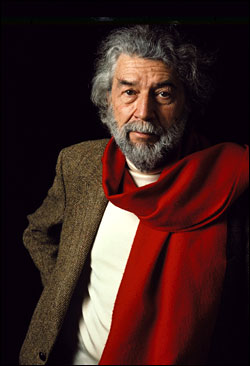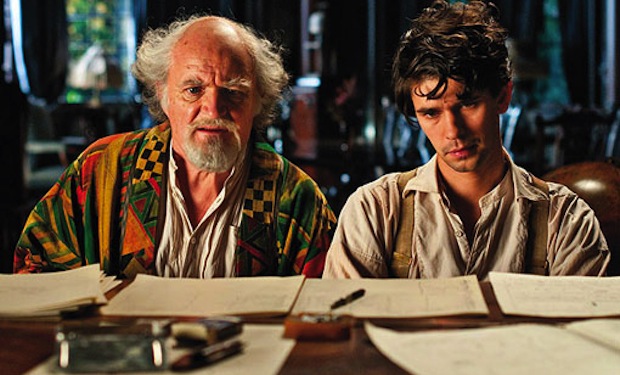How vulgar, how vain, how false
 •
by
•
by Silas Soule
Live Sharp
 Look Smart
Look SmartClick here. Play music now.
"Mother should I trust the government?
Mother will they put me in the firing line?
Ooooh aah, is it just a waste of time?"
Dear loyal readers, curiosity-seekers, friends, frenemies, hangers-on and those just stepping in out of the cold,
As you can see, I have changed the name of this rag once again. Do not be afraid! I've been using this "Players Quarterly" logo as kind of a sub-header for a while. Now I've just gone and made it all official-like.
The fact that this title allows me to use "PQ" as a logo also resonantes with me for some reason.

These gentlemen may appear to be resonating with PQ, but probably they're just thrill-seekers. And that's OK. I'd considered re-naming this mess to "Philosophy Comix", but that seemed so old hat.

Although the picture is fuzzy, this is closer to what I'm trying to convey. These vaguely-defined curiosity-seekers are oddly amused by that bum sitting on the sidewalk who may be mumbling to himself.
On with the show...
Wat's wat: Under the "PQ" banner, I intend to keep working on a couple of e-experiments in e-aesthetics and e-WTFism...
The first one is a "collective e-movie" called The Hatch. In the next edition of Players Quarterly, we'll revisit what that project is all about, review the story so far, and maybe even offer some nifty prizes!!

This is not the hatch you are looking for.
The other experiment I'm working on is a classical PQ "deep shit" philosopho-aesthetic dive, this time it's a dive into the e-poetics of protest. This effort can also be construed as "the shit" or, if you find that term confusing, "the good shit".

Dayum! That Good Shit!
Anyway...
As you might imagine, both of these efforts require a lot of
In order to keep what's left of my e-mind focussed on these difficult and ethereal but critical matters, I've found I need to step away from the Socialist Freedom Party too, at least for awhile. I am sure that other erstwhile SFPers will share the best of the socialist news and entertainment with you from time to time, so no worries there, SFP fans!
OK. So. Without any further bloviation, here's a summary to help you get caught up with the story so far...
=============================================================
Review/Summary/Backlog
Right-o. For those of you who failed to follow the twists and turns of my madcap philisophico-psychologico-aestheto adventures, here's a quick re-cap to help you get back in the game...
The full, unvarnished version of Part One of what seems to be shaping up as an epic orchestral piece on the e-poetics of protest can be found in the Day 2000 issue, titled Tears of Rage: A Day 2000 Commemoration.
The theory so far goes as follows...
Main thesis
"The e-poetics of protest are successful only when in a warring position and lose their legitimacy when in power." -- Phoenix Quinn
Themes presented so far
1. All e-community groups engage in sacred story-telling rituals that inexorably conclude in a spirit of sobering frivolity which celebrates the paradox created by the colliding guilts and pleasures which construct our perpetual lack of agency to escape the existential-consumerist prison of eRepublik.

“Our lives are not our own. We are bound to others, past and present, and by each crime and every kindness, we birth our future.” -- David Mitchell
2. All e-social groups that develop a written Lore tend to create a bifurcated Tradition with one stream that is "judicial" or "canonical" in nature, and another stream that is "spirited" or "aesthetic".

My Dad finally read Slaughterhouse Five the other day. I'd given him that copy of it 30 years ago, when he was the age I am now. He looks up and says to me all matter of fact, 'Oh hey, I'm reading this book you gave me. It's kind of weird.' Yeah. Guess it is. -- Phoenix Quinn
3. The originary moment of ambivalence between guilt and pleasure is always, in the end, a dramaturgical re-telling of the story of totemic parent figures who are at once murdered, mourned and venerated. An important variation on this theme subsitutes an e-child-martyr mimesis for the standard totemic-parent-sacrifice legend.

"Fantasy. Lunacy.
All revolutions are, until they happen, then they are historical inevitabilities.” -- David Mitchell
4. The e-child-martyr variations heighten the intensity of the drama by continually re-inflicting the guilt/atonement cycle on the e-community rather than simply re-telling it. For this reason, some of the most enduring eRepublikan cults are of this variety. This type of intense drama continually forces open a Hegelian gap, or if you prefer, creates the premonition of a "divine shaping" of events that is "pregnant" with new forms of e-history.

“The better organized the state, the duller its humanity.” -- David Mitchell
5. E-poetic protest-traditions that deploy child-martyr totems inevitably split into two sharply diverged streams: a highly textualized judicial stream that reverts, especially once in power, towards a deferred obedience that is indistinguishable from though often even more extreme and authoritarian than the default-outcome deferrence obedience of parent-martyrology mimetics, AND a stream of defiance that is energized entirely by a type of zeal for a new synthesis, a "spirit of youth", if you like, that could be likened to an enthusiasm for prophecy that is opposed to a disciplined modernity.

“How vulgar, this hankering after immortality, how vain, how false. Composers are merely scribblers of cave paintings. One writes music because winter is eternal and because, if one didn't, the wolves and blizzards would be at one's throat all the sooner.” -- David Mitchell
The conundrum
It seems to be the case that the codification of the e-poetics of revolt, even when emerging from a "youthful" grouping, tends to regress when in power towards the same type of "spectacularized" obsessions, especially the occupation of images and disaggregation of free time by Capital, that are commonly associated with any standard-issue patriarchal story-line.
The implied questions
Is a different outcome thinkable? And if so, how would one set about thinking it?

Exhale...


Comments
Yes, that is Alain Robbe-Grillet in the red scarf.
Goddamn, man. Mind==blown.
Hope this means you're not publishing quarterly only.
Still such an artist. Great stuff PQ.
deja-vu
all over again
koyacağın capslere sokuyum kardeş
"5. E-poetic protest-traditions that deploy child-martyr totems inevitably split into two sharply diverged streams: a highly textualized judicial stream that reverts, especially once in power, towards a deferred obedience that is indistinguishable from though often even more extreme and authoritarian than the default-outcome deferrence obedience of parent-martyrology mimetics, AND a stream of defiance that is energized entirely by a type of zeal for a new synthesis, a "spirit of youth", if you like, that could be likened to an enthusiasm for prophecy that is opposed to a disciplined modernity."
This part particularly resonates for me. I have observed it repeatedly in several eCountries lately. The interesting thing is that the "stream of defiance" people often cannot find anything real to complain about, so they invent things in order to have some reason to rebel.
This sounds like Freud. Although, I know he wasn't the only one to say it.
I studied, in prison. That's also where I read the Communist Manifesto.
Don't mind me, I'm just marking my territory.
Quite right.
Your preaching to the choir... Amen!
I like Cloud Atlas too
'You see me now a veteran of a thousand psychic wars
Ive been living on the edge so long
Where the winds of limbo roar
And Im young enough to look at
And far too old to see
All the scars are on the inside
I'm not sure if there's anything left of me'
Blue Oyster Cult - Veteran of the Psychic Wars